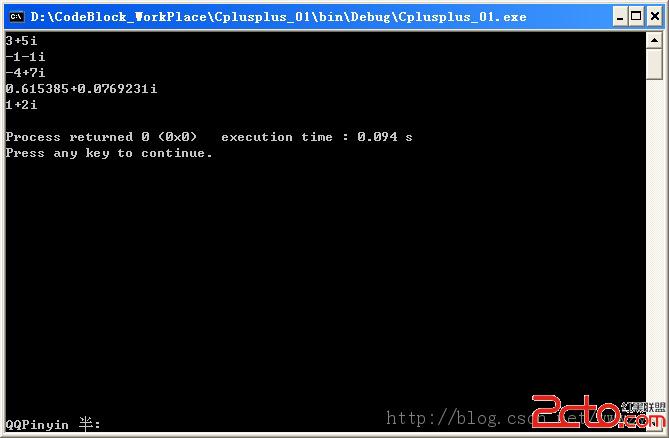最近看了一下Effect c++ 想要重新理解一下c++的機制以及內存布局,還是想搞這方面的研究,對底層不明白,總是有點很不踏實。
那就寫了一個 Complex 類,這個類還是相對比較全的,基本上涵蓋了一些運算。請大神飄過,勿噴,謝謝合作。
Complex.h文件
#ifndef __COMPLEX_H__ #define __COMPLEX_H__ #include#include using namespace std ; class Complex{ public: Complex(); Complex(Complex&); Complex(double); Complex(double,double); Complex& operator = (Complex&); ~Complex(); double getA(); double getB(); void setA(double); void setB(double); Complex operator + (double); Complex operator - (double); Complex operator * (double); Complex operator / (double); Complex& operator += (double); Complex& operator -= (double); Complex& operator *= (double); Complex& operator /= (double); bool operator == (double); bool operator == (Complex &c); Complex operator + (Complex&); Complex operator - (Complex&); Complex operator * (Complex&); Complex operator / (Complex&); Complex& operator += (Complex&); Complex& operator -= (Complex&); Complex& operator *= (Complex&); Complex& operator /= (Complex&); private: double a; double b; }; ostream& operator << (ostream &,Complex &); Complex operator + (double,Complex &); Complex operator - (double,Complex &); Complex operator * (double,Complex &); Complex operator / (double,Complex &); Complex pow(Complex &,int); #endif // __COMPLEX_H__
#include "Complex.h"
Complex::Complex():a(0),b(0){}
Complex::Complex(Complex& c):a(c.getA()),b(c.getB()){}
Complex::Complex(double _a):a(_a),b(0){}
Complex::Complex(double _a,double _b):a(_a),b(_b){}
Complex::~Complex(){};
Complex& Complex::operator = (Complex&c){
this->a = c.getA() ;
this->b = c.getB() ;
return *this;
}
double Complex::getA(){
return this->a;
}
double Complex::getB(){
return this->b;
};
void Complex::setA(double _a){
this->a = _a ;
}
void Complex::setB(double _b){
this->b = _b ;
}
bool Complex::operator == (double a){
Complex c(a);
return *this == c ;
}
bool Complex::operator == (Complex &c){
if(this->a == c.getA() && this->b == c.getB())return true;
return false;
}
Complex& Complex::operator += (Complex&c){
this->a += c.getA() ;
this->b += c.getB() ;
return *this;
}
Complex& Complex::operator -= (Complex&c){
this->a -= c.getA() ;
this->b -= c.getB() ;
return *this;
}
Complex& Complex::operator *= (Complex&c){
this->a = ((this->a)*(c.getA()) - (this->b)*(c.getB()));
this->b = ((this->a)*(c.getB()) + (this->b)*(c.getA()));
return *this;
}
Complex& Complex::operator /= (Complex&c){
if(c == 0)throw "error" ;
else {
*this = (*this) / c ;
}
return *this;
}
Complex& Complex::operator += (double a){
Complex r(a) ;
*this+=r;
return *this;
}
Complex& Complex::operator -= (double a){
Complex r(a) ;
*this-=r;
return *this;
}
Complex& Complex::operator *= (double a){
Complex r(a) ;
*this*=r;
return *this;
}
Complex& Complex::operator /= (double a){
Complex r(a) ;
*this/=r;
return *this;
}
Complex Complex::operator + (Complex&c){
Complex r ;
r.setA(this->a + c.getA()) ;
r.setB(this->b + c.getB()) ;
return r ;
}
Complex Complex::operator - (Complex&c){
Complex r ;
r.setA(this->a - c.getA()) ;
r.setB(this->b - c.getB()) ;
return r ;
}
Complex Complex::operator * (Complex&c){
Complex r ;
r.setA(((this->a)*(c.getA()) - (this->b)*(c.getB()))) ;
r.setB(((this->a)*(c.getB()) + (this->b)*(c.getA()))) ;
return r ;
}
Complex Complex::operator / (Complex&c){
Complex r = c;
if(c == 0 )throw "error" ;
double t = c.getA()*c.getA() + c.getB()*c.getB() ;
r.setB(-1*r.getB()) ;
r = ((*this) * r) * (1.0/t) ;
return r;
}
Complex Complex::operator + (double a){
Complex r(a) ;
return (*this)+r;
}
Complex Complex::operator - (double a){
Complex r(a) ;
return (*this)-r;
}
Complex Complex::operator * (double a){
Complex r(a) ;
return (*this)*r;
}
Complex Complex::operator / (double a){
Complex r(a) ;
return (*this)/r;
}
ostream& operator << (ostream &out,Complex &c){
double a = c.getA() ;
double b = c.getB() ;
if(a == 0 )
{
if(b==0)out<<0;
else out<
Main.cpp文件
#include
#include "Complex.h"
using namespace std;
int main()
{
Complex a(1,2);
Complex b(2,3);
cout<
測試結果:

可能寫的倉促,沒有想到的功能。逐漸完善。